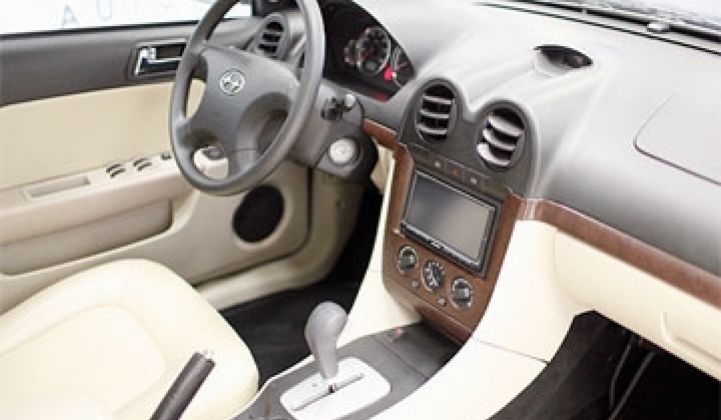Earlier this month, Coda board member John Bryson said that the Chinese government would inject about $500 million into the company to make sure that its plan to produce all-electric economy cars takes flight. Coda press relations nuanced it a bit: there would be $100 million in direct investment and $294 million in capital commitments from banks.
The official announcement came out today. The joint venture between Coda and Lishen Power Battery for making batteries for Coda's cars has received $100 million in equity and the Bank of Tianjin Joint Stock Co. has issued a $294 million line of credit. Coda proper has raised over $75 million itself.
Coda hopes to release cars in the U.S. toward the end of this year and deliver 15,000 by the end of 2011.
But don't call it a Chinese car. That really bugs CEO Kevin Czinger. The car will be manufactured in China. The battery comes from China and a lot of the capital behind the battery conglomerate comes from China. Bryson himself said the Chinese government is intent on making sure it succeeds. The car is also originally based on a Chinese gas-burning car from state-owned Hafei.
Czinger, though, argues that the base car has been re-designed by U.S. engineers so it doesn't resemble the Hafei car (which is based around a Japanese car design) that much anymore. Many components also come from the U.S. Coda also partnered with Chinese manufacturers, he adds, because European and U.S. manufacturers weren't keen on the idea of allowing a competitor to produce cars in their factories. Going to China and finding a partner was the best way to get the car to market without spending the massive amounts of capital required to build a factory, Czinger has noted. (Quite a few Coda investors are from the U.S., as well. Remember Hank Paulson? The gravelly-voiced former Secretary of the Treasury who came up with the TARP program? He's an investor.) One would think that there are DOE loans for future facilities involved somewhere.
Whether or not you agree with Czinger, 2010 is shaping up to be the year that China will become a more visible player in the global auto market. To date, China has mostly served as a somewhat invisible contract manufacturer in automotive. BYD is readying electric cars. Zhejian Geely also just bought Volvo from Ford to enter the global market in much the same way Lenovo (formerly Legend) bought IBM's PC group to go international.



